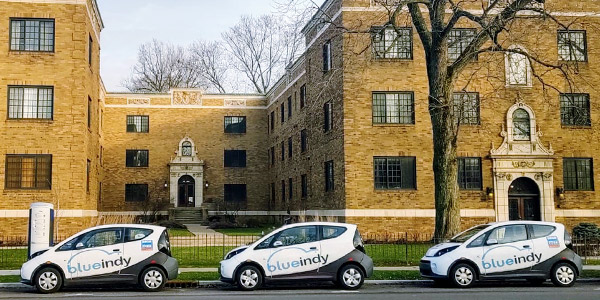By Amanda Durish Cook
Marketed as an eco-friendly alternative to car ownership, Indianapolis’ BlueIndy electric vehicle rideshare service will cut the engine and go out of business this spring.
After four years of providing shared EVs, French owner Bolloré Logistics will end BlueIndy’s operations May 21, leaving city leadership to decide whether to purchase the company’s assets.
BlueIndy said it “did not reach the level of activity required to be economically viable,” reporting that it attracted about 11,000 members who took about 180,000 rides over the ride-sharing service’s existence.
Complicating matters, BlueIndy indefinitely suspended the service beginning this week in response to the spreading COVID-19 pandemic in Indianapolis.
“We thank you for your understanding and hope to be able to restore service as soon as the situation permits. Let us remain united and responsible,” BlueIndy’s homepage read.
It remains to be seen whether customers will ever again have the chance to drive a BlueIndy car.
Wrong Market?
BlueIndy had bestowed the Indiana capitol with the distinction of the largest network of public charging stations of any U.S. city. However, critics from the start said the service only makes sense in a higher-density city with a smaller geography — not Indianapolis’ nearly 880,000 inhabitants spread over 372 square miles. Bolloré Logistics spun off a Los Angeles version of the service — BlueLA — in partnership with the Los Angeles Department of Transportation. The sister rideshare remains open though operations there are also suspended due to COVID-19.
“Indianapolis drivers have been slow to adopt alternative transportation options and car ownership remains extremely high,” BlueIndy explained in a late 2019 press release.
Now Indianapolis is weighing whether it should purchase the approximately 90 EV charging stations scattered on public rights-of-way throughout the city. BlueIndy originally anticipated owning as many as 500 cars and up to 200 stations in the city.
“Leading up to [May 21], we will be having conversations with neighbors, corporate partners and personal mobility advocates to explore whether financially sustainable options exist that would allow us to put the existing infrastructure to use — either with another ride sharing program or as charging stations for electric vehicles,” City of Indianapolis Deputy Chief of Staff Taylor Schaffer said in an email to RTO Insider.
Schaffer said Indianapolis’ 15-year contract with Bolloré Logistics stipulates the city can notify the company it would like to purchase the infrastructure at any point within 90 days of the contract’s end.
“This means the city has until mid-August to decide whether to purchase the infrastructure or not,” Schaffer said.
Schaffer did not comment on a possible purchase price for the assets, though the city has previously said it has the option to appraise and negotiate a fair market value.
BlueIndy got off to a rocky start in 2016 when the Indianapolis City-County Council contended that Bolloré Logistics’ process for placing stations lacked transparency. (See BlueIndy EV Sharing Program Seeks Rebound.) As a result of negotiations, BlueIndy paid the city an annual $45,000 franchise fee meant to cover the loss of parking meter payments due to the curbside stations.
The project was slated to cost a total of $50 million, with the company investing $41 million, the city contributing $6 million and Indianapolis Power & Light Co. ratepayers covering the remaining $3 million.
In 2017, BlueIndy showed a $22.5-million deficit. The company has not released recent financial standings.
Indianapolis’ former Republican Mayor Greg Ballard called the service a “clean, affordable transit option to help connect visitors and residents with all that Indy has to offer” when the collaboration was announced in 2015.
It’s unclear how much BlueIndy was affected by IndyGo’s new rapid transit electric bus line, which opened its first route last year along many of BlueIndy’s curbside electric charging stations.
Multiple requests to interview remaining BlueIndy employees went unanswered. BlueIndy Managing Director James Delgado appeared to stop tweeting about the service in early 2019.
“We believe that the continued reliance and predominant use of traditional personal vehicles is not sustainable long term in a growing urban environment and the need for additional mobility options to complement operators in Indianapolis including BlueIndy, IndyGo and the Pacers Bikeshare is significant,” BlueIndy said last year.






